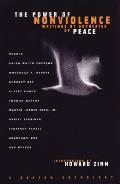 The eleventh chapter of The Power of Nonviolence: Writings by Advocates of Peace contains Albert Camus‘ 1946 essay Neither Victims nor Executioners. This week we discuss the fourth part of the essay, Parody of Revolution. Camus wrote this 16-page essay as World War II had just ended, and it seemed as if the Soviet Union and the United States were dragging the planet into the horrors of a third world war. Eleven years later, he would win the Nobel Prize for Literature.
The eleventh chapter of The Power of Nonviolence: Writings by Advocates of Peace contains Albert Camus‘ 1946 essay Neither Victims nor Executioners. This week we discuss the fourth part of the essay, Parody of Revolution. Camus wrote this 16-page essay as World War II had just ended, and it seemed as if the Soviet Union and the United States were dragging the planet into the horrors of a third world war. Eleven years later, he would win the Nobel Prize for Literature.
I recently heard a lecture where a speaker insisted the only successful revolutions were the French Revolution, the Soviet Revolution, and the Chinese Communist Revolution. The speaker’s definition of a successful revolution was that the power class had to be displaced. Since all of those revolutions were violent, the speaker insisted that only violent revolutions are successful. The speaker discounted all of the nonviolent revolutions of the 20th Century (US Civil Rights, Gandhi in India) as unsuccessful. Camus describes revolution as follows:
Ideally, a revolution is a dialogue in political and economic institutions in order to introduce more freedom and justice; practically, it is a complex of historical events, often undesirable ones, which brings about this happy transformation.
Camus argues that national revolution is never possible without at least the silent complicity of the world’s superpowers. For instance, the Maldives could not have a coup without the United States standing aside. Continue reading Camus’ Neither Victims nor Executioners: Parody of Revolution →



